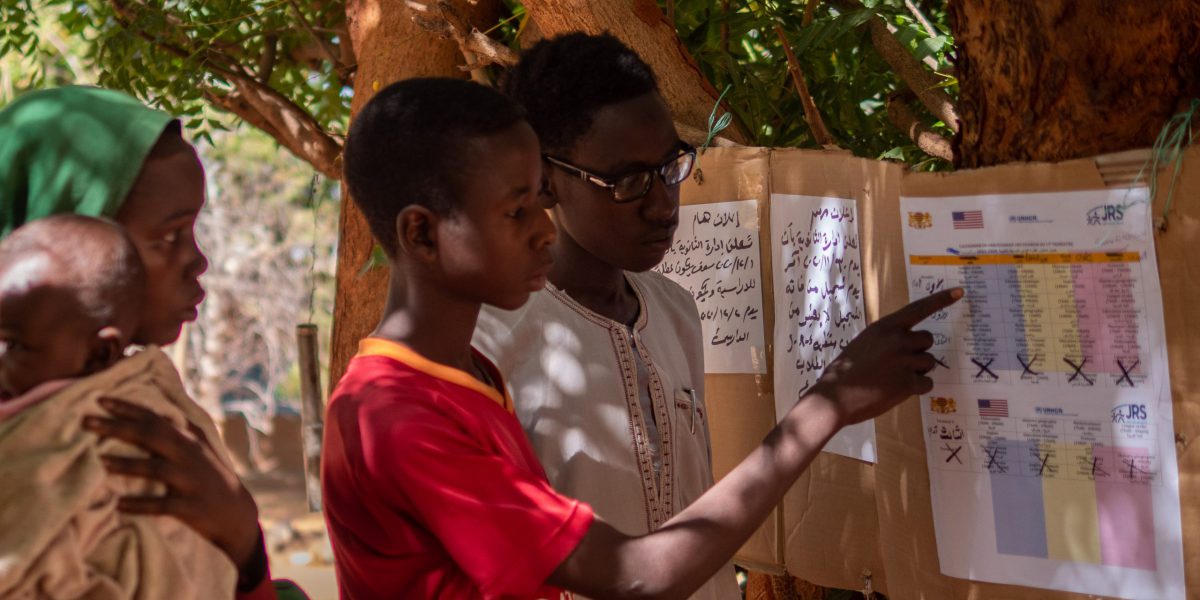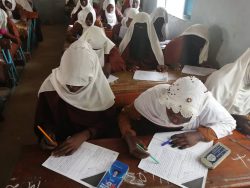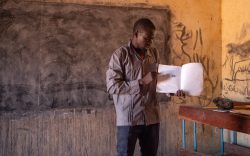JRS Chad & PRM: Back to School for Sudanese Refugees
22 August 2023|Chloe Gunther

In April 2023, conflict and violence erupted in Sudan. Thousands have died and hundreds of thousands have been forced to flee their homes. In neighboring Chad, Jesuit Refugee Service (JRS) has been working on the ground to meet the needs of those refugees arriving at the border, including education. Now, with back-to-school season quickly approaching, the JRS community is focusing on making sure that refugee students have access to education.
Over 330,000 Sudanese refugees have arrived in Chad and over half of those arriving are children. When a refugee is forced to flee their home, their entire routine, community, and  support system is uprooted. One of these life-altering changes includes leaving school, and for many, this change is permanent. According to UNHCR, 48% of refugee children remain out of school. For Sudanese children in Chad, only 55% will be able to enter the Chadian system.
support system is uprooted. One of these life-altering changes includes leaving school, and for many, this change is permanent. According to UNHCR, 48% of refugee children remain out of school. For Sudanese children in Chad, only 55% will be able to enter the Chadian system.
This lack of access in Chad stems from several barriers including language, curriculum, and resources. In Sudan, nearly all classes are taught in Arabic whereas in Chad, many classes are taught in French. Abdelkim Arbab is a 22-year-old Sudanese student “It’s very frustrating,” he said, “to be in a class at school in a language that you don’t understand.”
Abdelkim arrived in Chad when he was just five years old. At home, his family speaks Arabic so that is the only language he knows. Now, he takes classes with JRS Chad to learn French.
“Thousands of new people have arrived because of the outbreak of war, I would like them to have the same opportunities as us to learn French,” Abdelkim said.
JRS’s French classes for long-term Sudanese refugees and other components of their comprehensive approach to solving this education gap are funded largely by the US Department of State: Bureau of Population, Refugees, and Migration (PRM). Soon, this funding will expand to also support the hundreds of thousands who have arrived since April.
Emery Sandy is the JRS Chad Program Officer. He discussed the accelerated learning program he and the JRS Chad community have implemented to get Sudanese students ready to start school this fall.
The Chadian curriculum is paced differently from Sudan’s so even those who were able to attend school amid the conflict in Sudan experience a gap in their level of knowledge and the level of their Chadian peers.
Refugees with backgrounds in teaching are essential in solving this problem. Sandy explained how teachers arriving from Sudan participate in a six-day intensive training program that addresses curriculum concerns as well as mental health and psychosocial support needs.
“We have to train teachers so that they can help children cope with the trauma they have gone through,” Sandy said.
In a recent newsletter, Ahmad Adam, a Sudanese teacher now living in Chad, explained how he uses his own familiarity with displacement to help his students cope.
“I try to explain to them that there they can feel safe, calm, and that little by little they will forget the horrors they have been through. At school, we try to build a better future for them,” he said.
 Since the significant increase in Sudanese refugees, finding space to teach and the resources to do so has been a challenge. Four additional refugee camps have been built in the last four months but there are very few schools accessible to those in the now 17 refugee camps.
Since the significant increase in Sudanese refugees, finding space to teach and the resources to do so has been a challenge. Four additional refugee camps have been built in the last four months but there are very few schools accessible to those in the now 17 refugee camps.
He emphasized the need for sustainability within this accelerated learning program. “We need to make sure these schools are still there when JRS leaves.”
Despite these challenges, many Sudanese students have hope and are working, diligently, to prepare for a bright and successful future. Mahammat is one of these refugees. He is 18 years old and working towards becoming a doctor.
“I love physics and chemistry; I want to be a doctor to cure diseases. JRS has been supporting my education since 2015 by providing accompaniment and school materials,” he said.
Fadila Ali Djouma is a mother of six children. She just took the Baccalaureate (BAC) exam in Chad which all students must pass to be able to attend university.
“Preparing for this exam has been very difficult due to my work and the care of my six children. This year’s exam has been very hard for us Sudanese students,” she said.
“We have a great team here,” Sandy said, but they need additional support to ensure the program’s success.
“Going to school helps us to build a future. If Sudan finds stability, I will go back with my family but if there is no peace, we will be in Chad,” said 19-year-old student, Fatouma.
Many Sudanese refugees are hopeful that they will be able to return home once the conflict has ended. They are committed to educating themselves and pursuing fruitful careers so that when their home is safe again, they will be ready.



